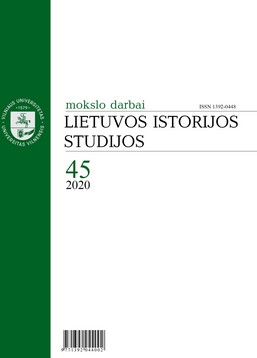
Kai nusikalstama dėl politikos
Apie Sigitos Černevičiūtės disertaciją „Politiniai nusikaltimai Lietuvoje 1919–1940 m.: teisėkūra ir teismų praktika“ ir jos gynimą
More...We kindly inform you that, as long as the subject affiliation of our 300.000+ articles is in progress, you might get unsufficient or no results on your third level or second level search. In this case, please broaden your search criteria.

Apie Sigitos Černevičiūtės disertaciją „Politiniai nusikaltimai Lietuvoje 1919–1940 m.: teisėkūra ir teismų praktika“ ir jos gynimą
More...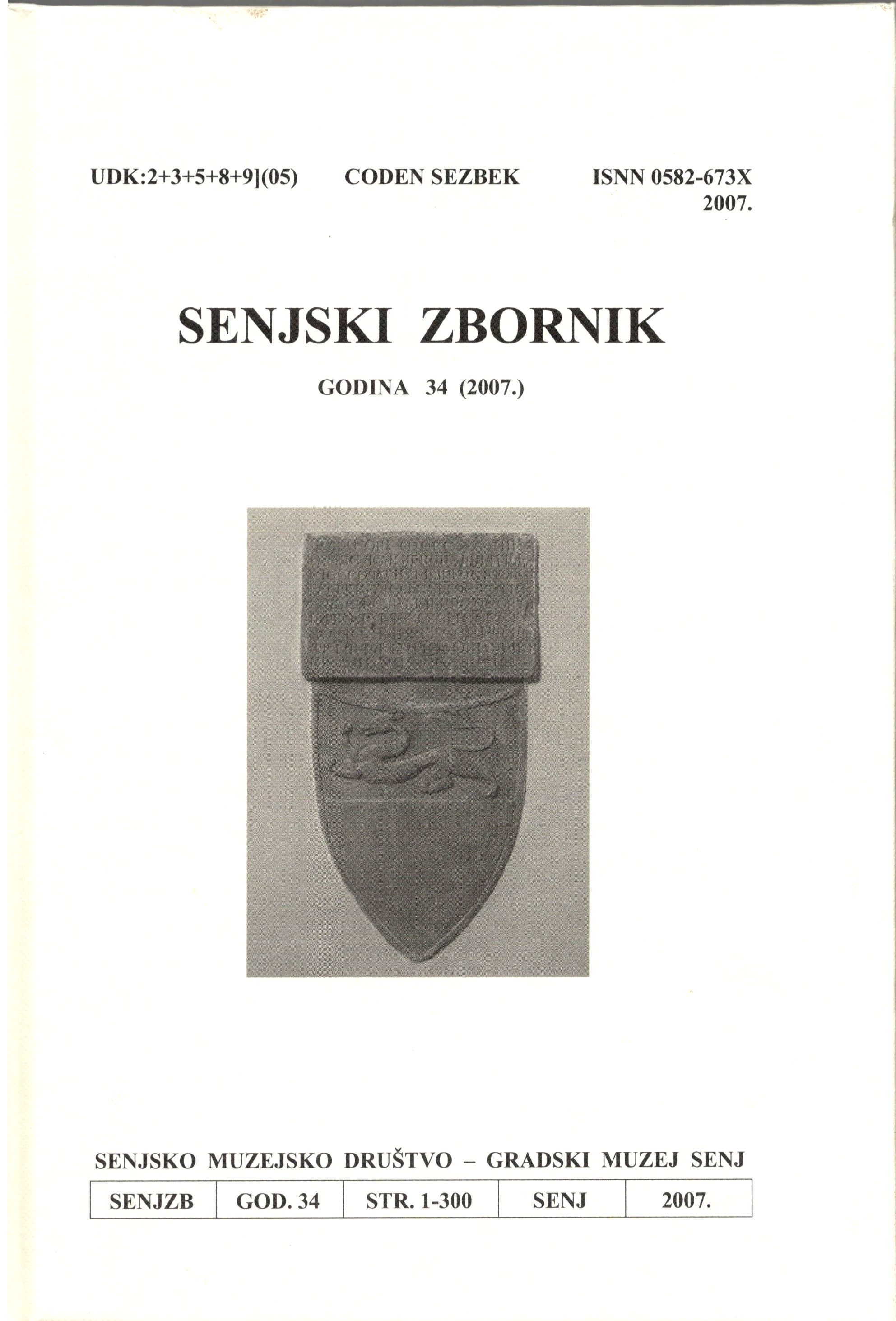
In this book the relationship between, on one side, the Counts of Krk, later named Frankapani (Frankopans) and one of the most important families in Croatia history and the town of Senj on the other side are first of all discussed. Senj came under the Frankopans’ government in the middle of the 13th century. Very soon the position of the Frankopans in Senj become very powerful and they acquired full feudal administration which they carried out through their representative known as a podknežin (vicecomes). The noblemen had special position in Senj and the Senj Statute from 1388 confirmed their privileged position. The legal system of the town according to the statute gives an opportunity for many insights into the legal institutions of north Croatian coastal towns and therefore it represents a very important source which usefully completes our knowledge about our legal history. In this way precious information about the penal law, and from the real and obligatory law here are presented the terms of usucapio and redemption. The book contains the original document in Latin and its translation in Croatian, and relative author's discussions. Especially important is the Croatian text of the Senj Statute which was created as a transcription from 1701. This text was probably prepared for practical use at court and similar occasions. This Croatian text was used in practise until the 18th century and its value for study of the legal system is precious.
More...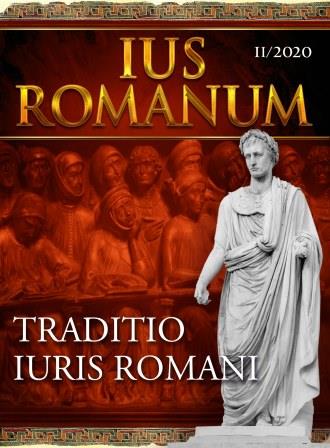
One of the problems that arose in urban development of the city of Rome was insulae overcrowding and congestion, which affects numerous parameters such as habitat protection of the city itself, given the need to evacuate and canalise organic waste products produced by human activity, the citizen's health and to guarantee the safe transit of pedestrians who often had to circumvent the road to avoid damage the caused by the spillage thrown from buildings, hence the study of the edict effusis vel deiectis whose footprint is inserted in art. 1910 of the civil Code.
More...
In connection with the dramatic shortage of residential accommodations in the first years of Polish statehood after the regaining of independence in 1918, the way to guarantee their provision for military personnel (officers and married non-commissioned officers) and civilians (state and local government officials) was a statutory obligation to provide them by means of legal administrative coercion. The aim of this article is to analyse issues relating to the requisitioning of flats, and in particular, to analyse the sources of legislation in this area at that time, and judicial decisions of the administrative court with regard to complaints made to this court in cases concerning these requisitions.
More...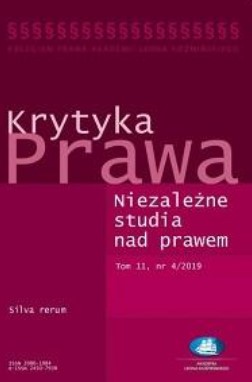
The paper shows an American model of the participation of the society in the administration of justice. It is crucial for the Polish discussion about the involvement of public factor in that manner. The analysis is divided between the constitutional right to trial by jury and the institution of justices of the peace, which is unique for the Anglo-Saxon legal system. Research conducted here is the result of a detailed analysis of the case law of the Supreme Court of the United States and selected state courts that shaped the views of the American academia on this issue. Hopefully, this brief study will help to reform the Polish judicial process.
More...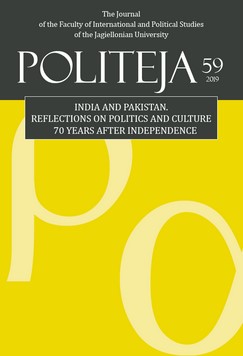
By all accounts, the Islamic Republic of Pakistan has the strictest “blasphemy laws” among countries with a majority Muslim population. The controversial amendments to the provisions of the Pakistan Penal Code on “offences relating to religion” go back to General Zia ul-Haq’s top-down policies of Islamization. Despite their flaws, doubtful legitimacy, and negative repercussions, the “blasphemy laws” have neither been reformed nor abolished under subsequent governments. This contribution will shed light on the complex political, economic, and social factors that have led to both the emergence of the laws and to the continuous escalation of the situation in terms of increased sectarian and religiously-motivated violence that the ongoing debate about the “blasphemy laws” has engendered. It may be asked, to what extent the controversy on the laws can be taken as indicative of problems with which the country was confronted since its formation, and to what extent shifts and transformations in the socio-political structure of Pakistan, the inability or unwillingness of the authorities to deal with the challenges in a systematic way, and also external factors have exacerbated these deep-rooted problems.
More...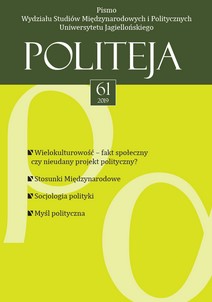
This article outlines the main philosophical and political issues of this late-Tudor Anglican divine. Hooker’s ideas, developed in Of the Laws of Eccclesiastical Polity, provide some atypical answers to typical questions about the state and its connection with the church. The first issue presented is the nature of law and reason: Hooker’s approach bears a strong resemblance to St. Thomas Aquinas’ thought here. We can also observe the naissance of a theory of a “social contract”, as society enters an agreement to nominate a governor over them. Hooker seems to be applying this theory to both the origins of the state and of the church. In describing the role of tradition in law-making, Hooker can be called the pioneer of the Conservative doctrine. We shall indicate the role of the Revelation in Hooker’s outlook and his polemics with the Puritans here. Finally, we will come to Hooker’s criticism of the theory of two powers, his favour of monism and its historical proponents, and to his arguments for the royal supremacy in England.
More...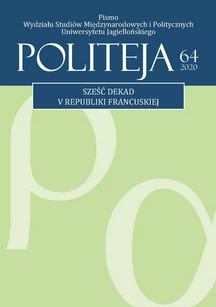
The article analyzes the French redistricting process (redécoupage) since 1789, tracing both the evolution of relevant legal norms through the transformations in the political regime and the electoral system, and the actual political practice – what were the driving forces behind consecutive redistrictings, how the districting rules and district boundaries themselves were manipulated for partisan and individual political gain, and how did the resultant district maps measure against standards such as electoral equality and political neutrality. The article concludes that while the French redistricting process remains highly politicized when compared with other European countries, the 2008 constitutional reforms and the changes resulting from them were substantial steps towards greater transparency. Moreover, there is no persuasive evidence that recent redécoupages were systematically manipulated for political purposes by the governing parties.
More...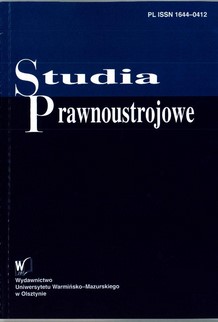
After the end of World War II and the takeover of power in Poland by the communists, repression began against people associated with the state administration of the Second Polish Republic. The authorities issued a number of legal acts allowing the use of repression against political opponents. Government officials of the Second Polish Republic and the wider elite of that country were also considered political opponents. Mere political activity or work in government administration could have caused repression. The communists recognized the interwar Polish authorities as hostile. Participation in exercising and exercising power after 1926 was often a sufficient excuse for repression. The repression used by the communist authorities took the form of both abuses of power and law-based activities. The latter will be discussed in this article. The Polish authorities issued a number of legal acts enabling discriminatory or repressive measures against specific persons or social groups. Some citizens were to be punished for their political and professional activity before the war. The repressions were related to both criminal- law and civil and administrative law. In addition to imprisonment and other penalties, opponents of the state faced nationalization as well as a campaign of administrative difficulty and harassment. These provisions require careful discussion. Their validity and application may currently form the basis for questioning the legality of a number of state actions. It should also be generally determined when service in the interwar administration or political activity ceased to constitute the basis for repression.
More...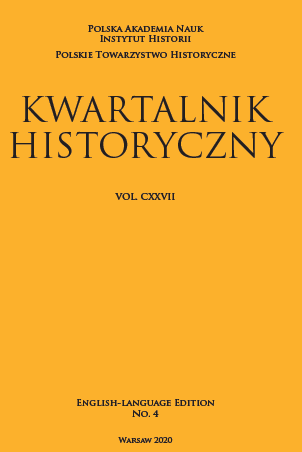
This article is an attempt to illustrate relations between the theory and practice of the military activity of Polish bishops under the rule of the Piast dynasty. The problem is discussed based on an analysis of the locally formulated ideal of episcopal power and the ideological and legal patterns reaching Poland that regulated the possibilities of using weapons by clergymen, and, in particular, defined the ways in which churchmen participated in wars and in declaring and conducting them.
More...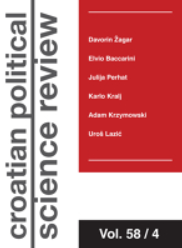
In contemporary Bosniak historiography on the Independent State of Croatia (NDH), Muslim resolutions have an important place – six political petitions sent by members of the Muslim religious and secular elite to the NDH authorities and to the public in autumn and winter of 1941. In the first part of the article, I describe the historical-political context in which the resolutions appeared. After that I point out the motives that prompted interest in those documents which were found in their alleged concealment and forgery in Yugoslav politics and historiography during the communist period. In the second part, I present interpretations of the content and meaning of the resolutions in the revisionist current of Bosniak historiography. In the third part, by using discursive analysis of resolutions, and by describing the war ideological and political profile of many of their prominent signatories, I show the real nature of these documents. In the concluding part, I analyze the dynamics and logic of the revisionist interpretation of Muslim resolutions – spatial and social dissemination and ideological and political falsification – as one of the foundations of the construction of anti-fascist history of Muslims/Bosniaks in World War II in general. I conclude that the Muslim resolutions were neither anti-Ustasha nor anti-fascist acts, but protest letters that had limited political goals: to influence the state to curb and control religious and ethnic violence and to protect the Muslim population from violence against it, but also to absolve it of responsibility for violence against other communities.
More...
Animals were a permanent element in the landscape of medieval towns. Many residents of the then urban centres lived of animal husbandry. In addition to farm animals (e.g. pigs), they kept domestic animals (e.g. dogs and cats) as well as wild animals. The latter often sought food in garbage and suburbs. Such animals were also kept for entertainment. Authorities of Prussian towns regulated many issues related to the functioning of towns, including those concerning animal husbandry. Animals could pose a threat to the health and life of residents. They were also considered to be pests that destroy crops, orchards, and household appliances. The legislation of the period was focused on determining guilt for crimes and offenses committed by animals. Either an animal, treated as an entity responsible for the harmful act, or its owner was blamed for the misconducts. The presence of animals, especially livestock, was considered to be the cause of considerable sanitary problems in towns, mainly due to animal waste. Town authorities regulated issues concerning cattle herding and grazing. The care over the herd was entrusted to urban shepherds whose service was regulated by town legislation. The problem of the perception of animals by the society of that time was also significant. Although seemingly unwanted, they were the only source of income for many residents. For some, animals were pests, and for others, a guarantee of fragile existence. It was also a time when people began to wonder what exactly an animal is, what role it should play in human life, and how to treat it.
More...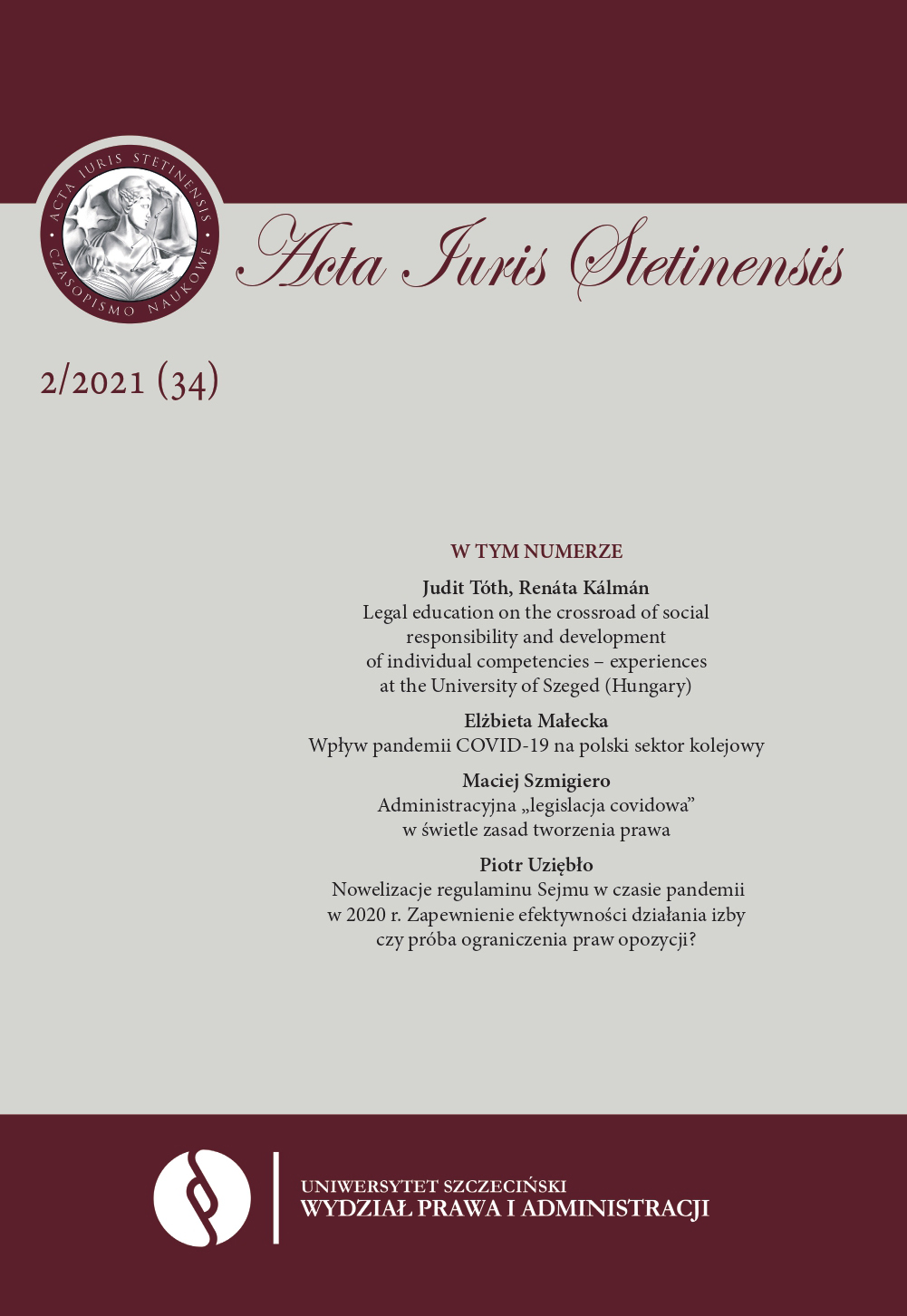
The authors describe the role of the legal clinical education as an instrument for community empowerment through pro bono legal counseling, easily understandable e-compilation (Vademecum) of legal terms, and extended legal practice for law students, together with the development of their professional competencies. The new requirements in legal education, as determined by the government in 2016, focus on labour market needs, but academics and leaders of the University of Szeged have created an amalgam of tools for access to justice for local residents and NGOs in a less wealthy social environment, thereby introducing changes in education. The article proves how difficult it is to change historically-determined traditions in legal education in an innovative way, developing social solidarity, legal responsibility, ethics, and communication skills of the future generation of jurists in Hungary. In the course of the research, the authors analyze their own experiences since the establishment of the Legal Clinic at the University of Szeged under predefined requirement, e.g. number and type of cases or form of help. As a result, key fields are revealed where the work of the Legal Clinic is essential, and such a conclusion provided great help to further develop the partnership system and the entire clinical legal education at the University of Szeged.
More...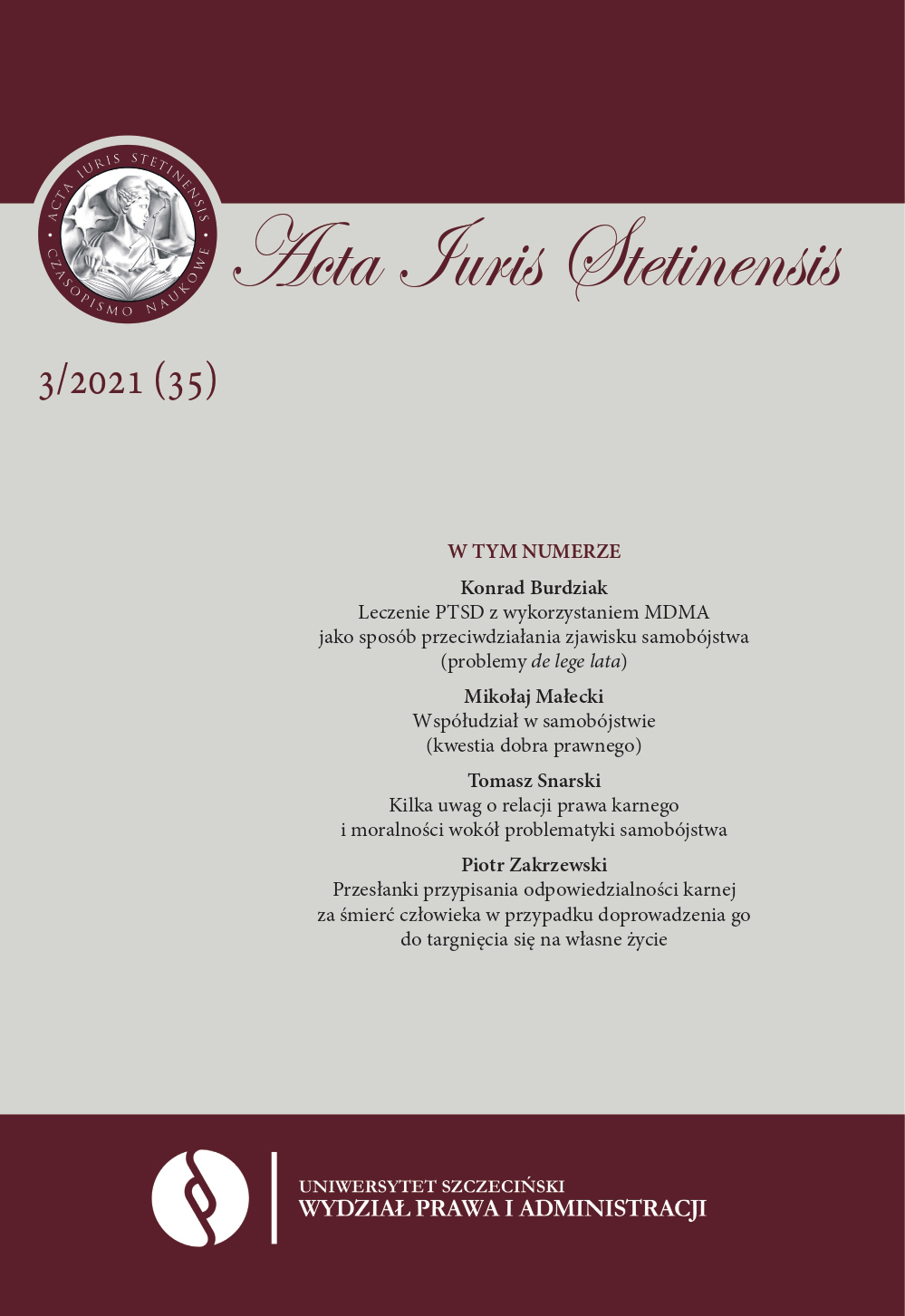
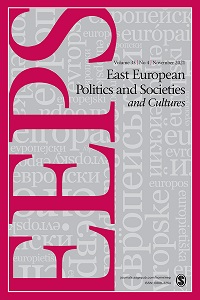
The article analyzes the biographies of the regional leaders of the Solidarity union and examines the process by which activists were recruited into the social movement and subsequently rose through its ranks. Though there exists an abundant body of research on Solidarity, the recruitment process for the trade union’s middle management has never been analyzed. Such an examination of the regional leadership is important given the significant diversity that existed in the selection process. Activists were selected in regions where strikes occurred (Gdańsk and Wałęsa) and in ones where there were no strikes. This article attempts to identify these regional leaders and their role in Solidarity. It poses questions about the social movement’s center of power. Did the regional leadership represent a grassroots social movement, or were they merely carrying out orders from the center? The subject of this analysis is a group of thirty-nine chairmen comprising the regional leadership of Solidarity. The article employs classical historical analysis methods combined with elicited sources (interviews conducted with selected leaders). It presents a prosopographical analysis based on statistical, historical, and sociological data. The questions posed in the article involve such issues as the Solidarity recruitment process, the social backgrounds of the leaders, their individual personality traits and biographical features, and the goals and motivations that led them to join the movement. The analysis reveals the qualities shared by the majority of the regional leadership of Solidarity.
More...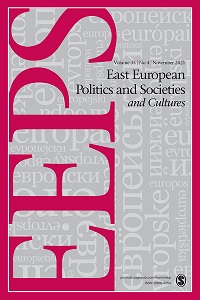
The rise of historical memory, which began in the 1970s and 1980s, has made the past an increasingly important soft-power resource. At its initial stage, the rise of memory contributed to the decay of self-congratulatory national narratives and to the formation of a “cosmopolitan” memory centered on the Holocaust and other crimes against humanity and informed by the notion of state repentance for the wrongdoings of the past. Laws criminalizing the denial of these crimes, which were adopted in “old” continental democracies in the 1980s and 1990s, were a characteristic expression of this democratic culture of memory. However, with the rise of national populism and the formation of the authoritarian or semi-authoritarian regimes in Russia, Turkey, Hungary, and Poland in the 2000s and 2010s, the politics of memory has taken a significantly different turn. National populists are remarkably persistent in whitewashing their countries’ history and using it to promote nationalist mobilization. This process has manifested itself in the formation of new types of memory laws, which shift the blame for historical injustices to other countries (the 1998 Polish, the 2000 Czech, the 2010 Lithuanian, the June 2010 Hungarian, and the 2014 Latvian statutes) and, in some cases, openly protect the memory of the perpetrators of crimes against humanity (the 2005 Turkish, the 2014 Russian, the 2015 Ukrainian, the 2006 and the 2018 Polish enactments). The article examines Russian, Polish, and Ukrainian legislation regarding the past that demonstrates the current linkage between populism and memory.
More...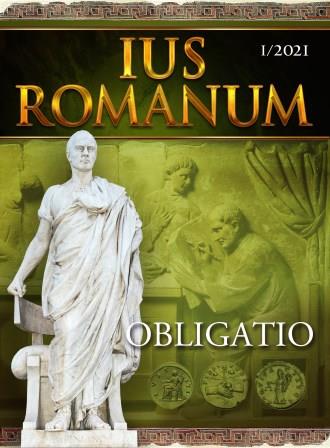
The Swiss Federal Assembly adopted the Swiss Civil Code on 19 December 1907 by roll-call vote and by unanimity of the members present. The code came into force on January 1, 1912. It was welcomed throughout the country as the "written will" of the Swiss. According to Prof. Walter Yung, the code strengthens the "Swiss feeling of being one people" and becomes one of the "spiritual treasures" of the country. Considered an example of clarity, simplicity and moderation, the Swiss Civil Code was soon reflected abroad and inspired the civil codification of many countries. Based on German legal sources, it "retains its characteristic appearance and combines a deep knowledge with purity of form, which provide the basis for an extraordinary flexibility, able to change according to all future changes, without losing its basic structure." The article consistently examines the origins and main sources on which the Swiss Civil Code is based, as well as its impact.
More...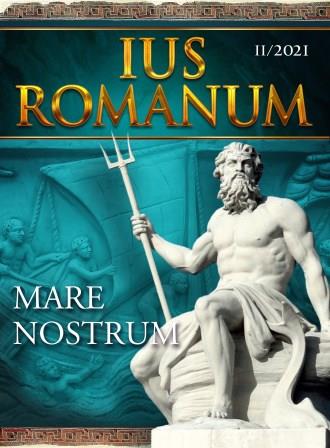
The research intends to examine the particular methods through which the jurist Callistratus dealt with the problems connected to maritime accidents and in particular to shipwreck, with special regard to the legal repercussions that ensued both in terms of the distribution of consequent risks and in terms of protecting and safeguarding transported goods.
More...
What was the legal status of those who were captured by pirates? Certainly not the servile one, as emerges from the texts of Ulpianus (D. 49.15.24) and Paulus (D. 49.15.19.2). However, the fact that the prisoners were frequently sold as slaves by pirates in the markets raises numerous legal questions about their actual status libertatis. The deplorable phenomenon of the sale of free men ‘capti a piratis’ is also in literary sources and it is in the light of these testimonies that I try to provide a contribution to the study of the ‘de facto slavery’ of prisoners of the marauders of the sea.
More...
This paper examines some of the legal perspectives of Rome’s fight against piracy. The main objectives of the study are to touch upon the notion of piracy in Republican Rome and the actions that were taken by the State against these „sea bandits“.
More...